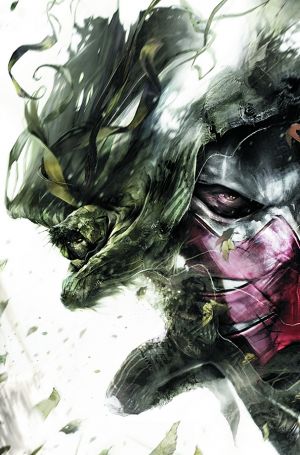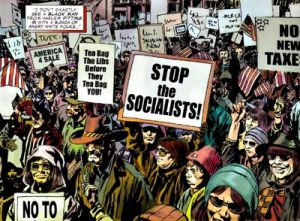- Comics
- Comics Reviews
- Manga
- Comics Reviews
- European Comics
- News
- Comics News
- Press Releases
- Columns
- Spotlight
- Digital Comics
- Webcomics
- Cult Favorite
- Back Issues
- Webcomics
- Movies
- Toys
- Store
- More
- About
By Andy Frisk
February 28, 2010 - 17:44
In Azrael #5, Michael Lane/Azrael disrupts an Israeli Special Forces incursion into Gotham City to forcibly extradite a suspected Palestinian terrorist accused of bombing a day care center in Tel Aviv. As Azrael is drawn deeper into his investigation of Youssif Mossad (the suspected terrorist) he encounters not only the complexity of 70+ years of Israeli/Palestinian conflict, the elusive facts of Mossad’s guilt or innocence, his fellow Gotham City based hero Ragman, but the destructive nature of zealotry as well…
 |
Writer Fabian Nicieza crafts a very powerful story in “Seams Undone.” The deep seated hatred and violence which has been driven by years of religious conflict between Israelis and Palestinians serves as a backdrop for an examination of Michael Lane/Azrael’s own religious zealotry, which is predicted to devour him at some point in the future. (Bearers of The Suit of Sorrows carry not only the suit itself, but the weight of the guilt and pain of those slain by its previous wearers and those who did the slaying-all in the name of “God’s Justice”). Azrael’s mission is to “go out and kill people in the name of the Lord?” “No, unless they deserve it…” explains Michael. What Ragman reveals to Michael though, after they both track down Mossad, is that the same righteous zealotry that Michael has fallen victim to is the same zealotry that has driven years of conflict and bloodshed in the Middle East. The destruction of innocent life as the result of such zealotry is inhuman, but it’s also “all they know how to do,” when face to face with another zealot’s hatred and insanity.
It’s obvious that throughout the tale, Nicieza is decrying the evils of zealotry such as that which has driven the religious conflicts in the Middle East, and by Christian fundamentalist types as represented with Azrael. While Azrael is a hero in nearly the all inclusive sense of the word, he is a bit of a fringe character. He has to toe the line between being a zealot and being a hero, due to the nature of his powers, which are derived from the “Suit of Sorrows” he has been chosen to bear. Ragman, the voice of reason in the story (and a Jewish character who is powered by his own suit which is composed of the souls of those recently departed who are seeking redemption), serves as the one character out of them all who can step outside their own religious beliefs and see objectively that there is nothing positive that can come from violence begotten of religious conflict. As it turns out, Mossad isn’t guilty of the bombing (which is in retaliation to an Israeli airstrike which killed innocent children on the West Bank), but his brother is.
 |
What makes this issue worthy of closer attention (besides reflecting what I hoped the character would do back in my review of Azrael #1: “... take on more complex villains and themes than just the regular run of the mill Gotham street thugs” and embrace the conflicts inherent in his Judeo-Christian background and origins) is that it demonstrates, yet again, how well mainstream comic book heroes can address, contribute to, and advance the conversation on religious, political, and social themes like many independent comics or even mainstream literature can. There’s been a lot of unwarranted and downright petty flap over the recent portrayal of a Tea Party (Tea Bagger) rally in Captain America #602 and the question over whether or not comics should address political themes. First off, and not to digress too far, the sign in question held up by a fictionalized Tea Bagger that stated “Tea Bag the Libs Before They Tea Bag You” was simply a recreation of a real sign held up by a Tea Party protester early last year. Putting aside that the crude reference was made in a comic book without a “mature readers” warning, the political flap that came out over this small reflection of some silly aspects of a political movement was unnecessary. The job of a writer who is willing to create a believable, relevant, and reflective story is to be as realistic as possible, even if that means being controversial at times. If you can’t take the lumps, don’t carry the signs. While there is nothing nearly as controversial as the Tea Bagger sign here in Azrael #5, it again is an intelligent and insightful look into a very important theme and religio-political conflict.
 |
| The real life inspiration for the sign in Captain America #602. |
The question shouldn’t be, “Do politics have a place as a subject in comic books?” but “Why isn’t there more of this type of storytelling?” A large majority of the fiction we read and the films we watch are permeated with these type of themes. Many of them end up being recognized by their creators’ peers as the best of their given genre. Films such as There Will Be Blood, All The President’s Men, and even Aliens, decry the evils of corporations, corrupt politicians and/or religious zealots. Why shouldn’t comics embrace these themes as well? I for one thank Ed Brubaker and Fabian Nicieza, for engaging us with relevant, important, and most of all intelligent storytelling.
Rating: 10 /10